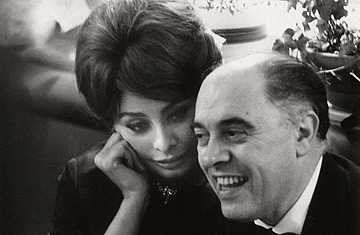
Carlo Ponti with wife Sophia Loren during the Cannes Film Festival in 1961.
(2 of 2)
Aside from his Sophia films, Ponti was at his busiest in the 60s and early 70s, when he sponsored a host of ambitious projects by gifted, strong-willed directors: David Lean's Doctor Zhivago, Michelangelo Antonioni's Blowup and Zabriskie Point, Jean-Luc Godard's A Woman Is a Woman, Les Carabiniers and Contempt, Jean-Pierre Melville's Leon Morin, Priest and Doulos the Finger Man, Agnes Varda's Cleo from 5 to 7, Claude Chabrol's Landru, Jiri Menzel's Closely Watched Trains and Milos Forman'sThe Fireman's Ball, plus Andy Warhol's Frankenstein and Roman Polanski's What?
"I don't make deals," he used to boast, "I make films." But Ponti wasn't a hands-on, obsessively creative producer like David O. Selznick; he was more the money-raiser and -maker. Which isn't to say that some directors didn't find him obtrusive. In the behind-the-scenes movie drama Contempt, the notoriously independent Godard based the coarse producer played by Jack Palance in part on Ponti, A scene in which Palance kicks cans of films around a screening room is supposedly based on a Carlo outburst. Ponti's one creative contribution to the movie was to insist that the female lead, Brigitte Bardot, be given a nude scene. Godard obliged, in his fashion, by opening the film with the naked Bardot quizzing her husband (Michel Piccoli) on his appreciation of her body parts — thus acceding to Ponti's demand and simultaneously undercutting it.
Godard wasn't the only one to get Ponti in trouble over his films. His first film as producer, the 1941 Piccolo Mondo Antico with the lustrous young Alida Valli, got him slapped in jail by Mussolini's fascists for supposed anti-German sentiments. In 1973 his movie Massacre in Rome, which detailed Pope Pius XII's collaboration with Nazi Germany, earned Ponti a six-month sentence — first suspended, then reversed on appeal. And in 1979 a Roman court slapped him in absentia with a four-year jail term and a $24 million fine for "illegal transfer of capital abroad." It took another decade for Ponti to settle the dispute and win the return of his art collection, which the government had seized.
Through all the turbulence, Ponti always had Loren as his champion and consoler. More than a half-century together, they seemed no longer a joke but a fairy tale. The leer of Italian gossips in the 50s turned to an indulgent smile and, today, a fond tear. Carlo and Sophia — it must have been love.
